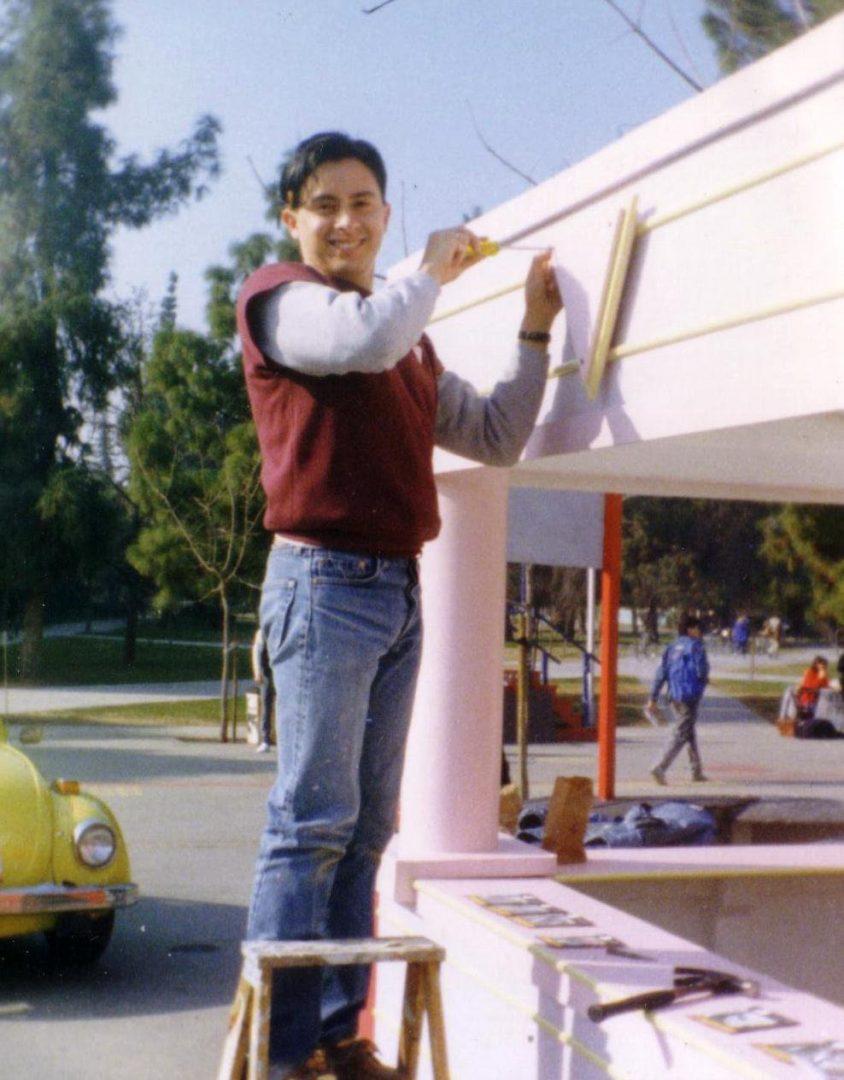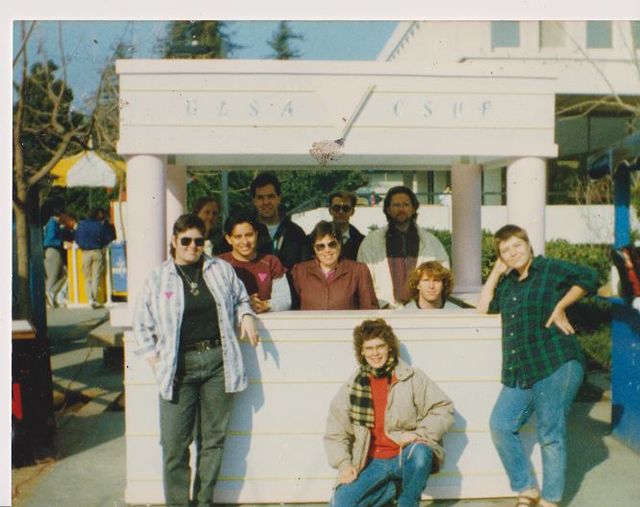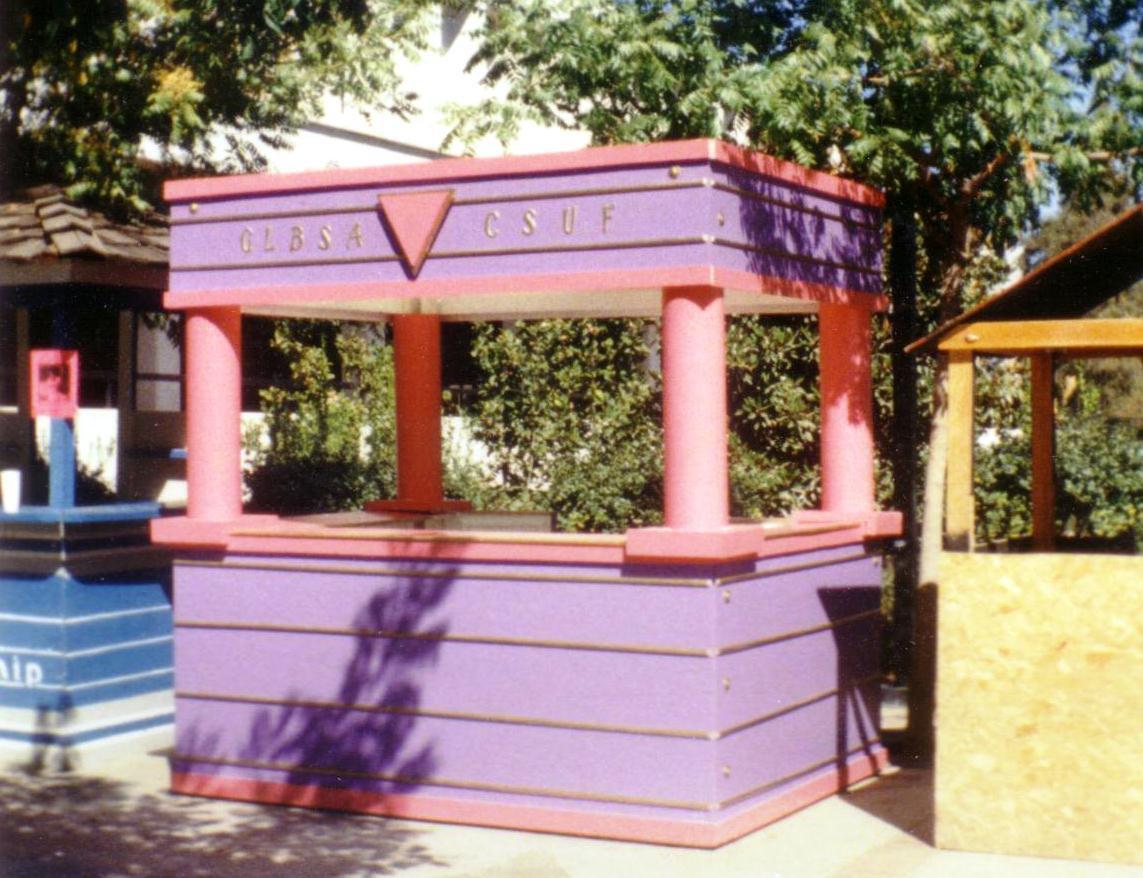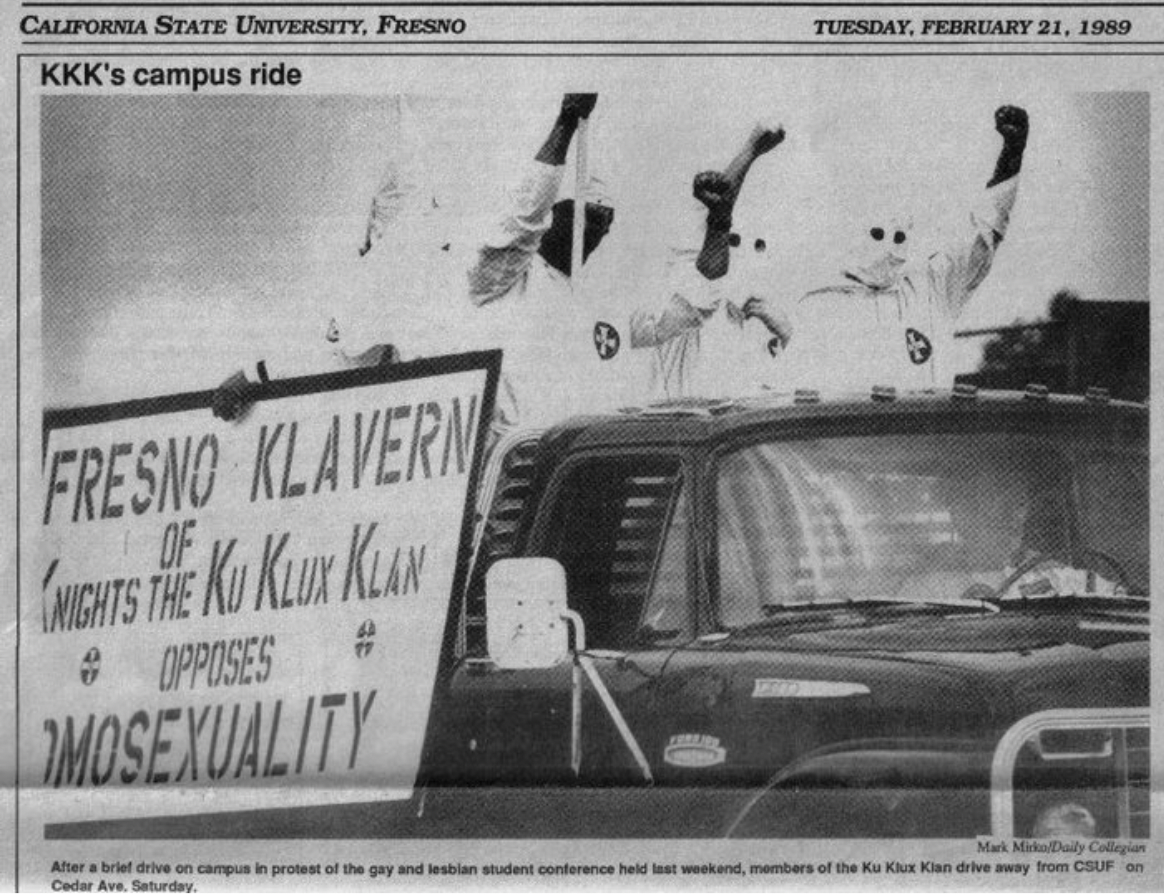In 1987, Ronald Reagan was president, the AIDS epidemic was at its peak and the nation was divided on LGBTQ+ rights.
In the fall of that year, a group of students formed the Gay Lesbian Student Alliance (GLSA) at Fresno State. A few months later on Nov. 30, unknown vandals burned down the booth.
Multiple recorded experiences of discrimination against the club followed.
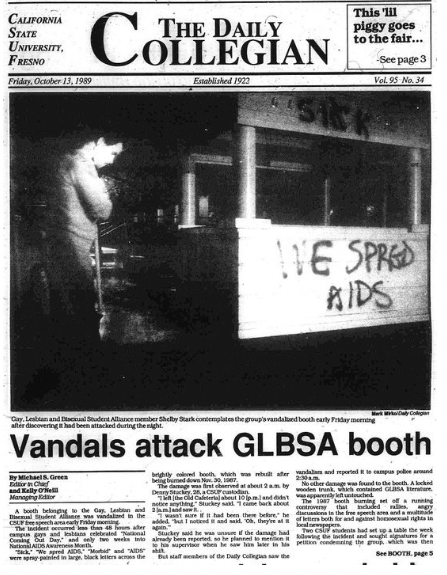
“I can’t go back and sugarcoat the experiences that I lived through as a student and saw my classmates go through, where it’s [us] being threatened, having people scream Bible verses at you, walking by and spitting on you — and this is just the lunch time. And now I’m supposed to go to class? It was a very, very emotional, stressful time to be a student,” said Peter Robertson, a founding member of the GLSA and current director of alumni communications at Fresno State.
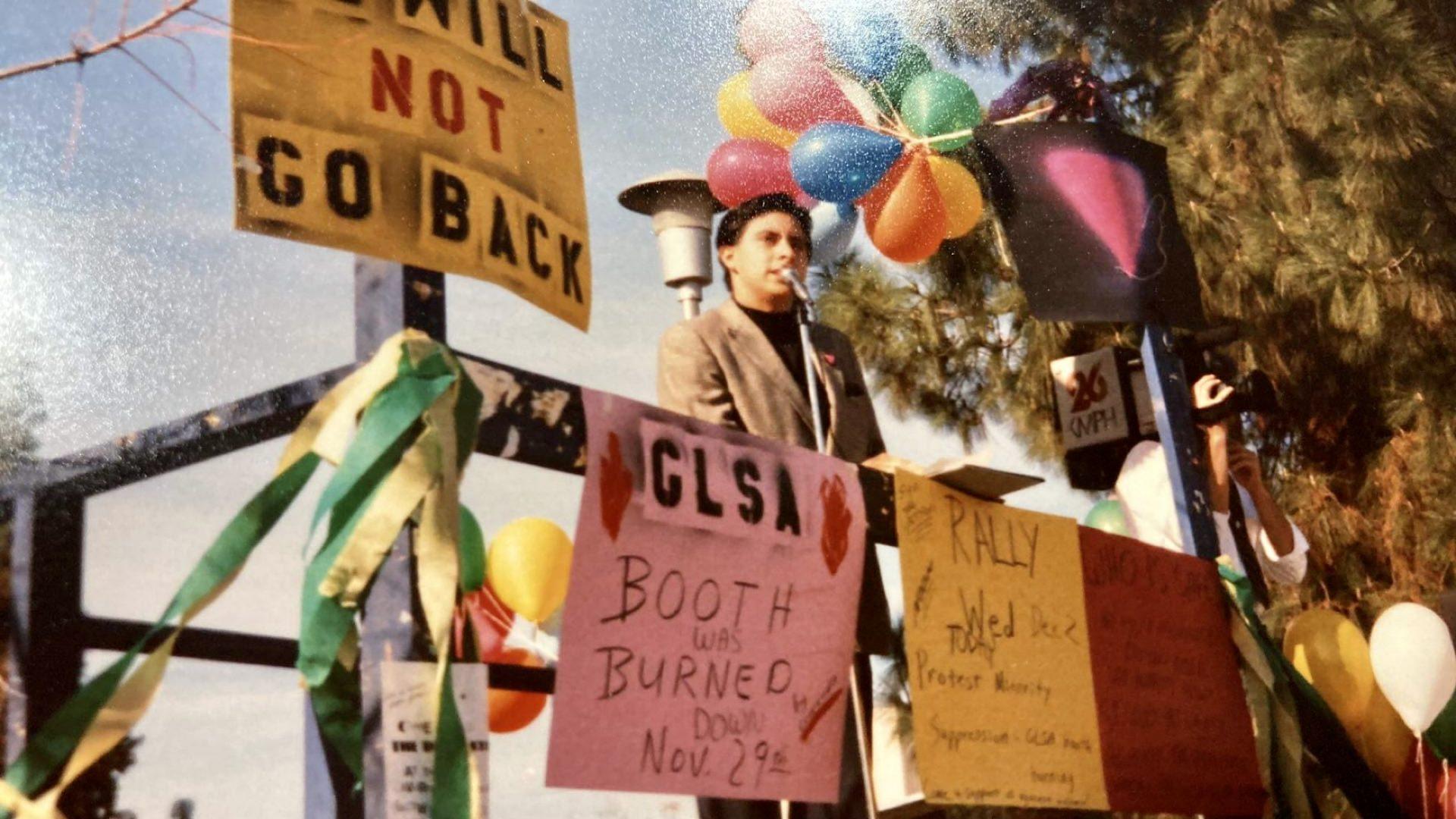
For a class project last semester, several Fresno State students in History 188 decided to research queer history in Fresno and were surprised by what they found.
The booth burning crime was never solved. The student body president vetoed the club’s funding months after. The Ku Klux Klan came to Fresno State the next year in protest of an LGBTQ+ conference.
Today these anti-LGBTQ+ attitudes can still be found, and former GLSA members are concerned that they could face another reversal of their rights.
“We expected college students to be better educated about the community, and more open-minded. I think it really made us think about how the campus is not the safe haven that we had always thought it was,” said student Madison Nichols in an interview.
Nichols, Jasleen Gill and Jackson Kiehlmeier decided to turn their History 188 class assignment into a publicly released podcast, titled “Our Tower,” in May 2022. The first episode, available now on Spotify and Anchor, features an interview with Robertson and discussion of events discussed in former Collegian and Fresno Bee articles.
In a three month investigation, The Collegian spoke to the three students who worked on the podcast, their professor, two former Collegian editor-in-chiefs, the founding GLSA advisor, three former GLSA members and two former student body presidents about their experiences.
Former GLSA members who spoke to The Collegian about their experiences said the negativity they experienced is not in the past.
“I think it’s a pendulum. Swings one way, really far. Strike back against it a little bit, it swings a little bit more your way and then it swings back the other way again. The trick is not to let it swing too far,” said Barbara Cooper, another founding member of the GLSA.
Cooper recalled waking up to a phone call that the booth had been burned on the morning of Nov. 30, 1987. It was Tim Hurrianko, The Collegian’s editor-in-chief in the fall of 1987, and his staff who discovered the blaze after leaving the office late after production of the paper.
“You couldn’t miss it. It was this glow around the building. We walked out and it was fully engulfed. I mean, full flames,” Hurrianko said in an interview with The Collegian.
Multiple anti-LGBTQ+ acts followed the booth burning incident. On Dec. 2, 1987, two Fresno State students, Frank Turner and Greg Whitlow, set up an anti-GLSA table “next to the charred sidewalk where last week the [GLSA] booth stood,” according to past Collegian articles.
The newspaper reported that the GLSA’s unity rally on that same day was mocked by hecklers who told them “you better make [the booth] metal this time.”
According to Cooper, there was an investigation, but she said the Fresno State Police Department disregarded students’ suggestions of who to talk to.
“Nothing ever came of it. There was no follow up, no discussions, not even helpful tips [like], ‘You guys really need to travel in twos or don’t be here on campus. Don’t be so open.’ We didn’t even get the cliche dismissals,” she said.
Six months later, in May 1988, student body president Mark Astone vetoed the GLSA’s approved funding.
Astone is now CEO of Catalyst Marketing Company and husband to Fresno State’s vice president for administration and chief financial officer, Deborah Adishian-Astone.
In an August 2022 email to The Collegian, Astone said he has always been an “ally and supporter” of LGBTQ+ rights, and that he remembers the funding veto “to be more about policy and appropriate use of ASI funds.”
“Being so long ago, I don’t remember a lot of details. Of course, I recall the burning of the GLSA booth and how appalled we all were and how wrong that was. It was a difficult time and there were varying perspectives on the issue,” Astone said.
However, The Collegian reported at the time that Astone wrote in a memo to then-senate chairman Scott Vick that his action was based on his “personal moral opinion.”
“I and society as a whole have not yet accepted this type of behavior as worthy of such public recognition as the access of public funds, and I cannot allow access of funds to this group until society deems it proper,” Astone wrote in the memo.
Vick, now an attorney and founder of Vick Law Group, succeeded Astone as student body president and restored the funding on July 1, 1988.
In a July 2022 email to The Collegian, Vick recalled that “the rights of gays and lesbians [were] controversial back then” and that he had “some problems” with Astone, mainly over LGBTQ+ issues.
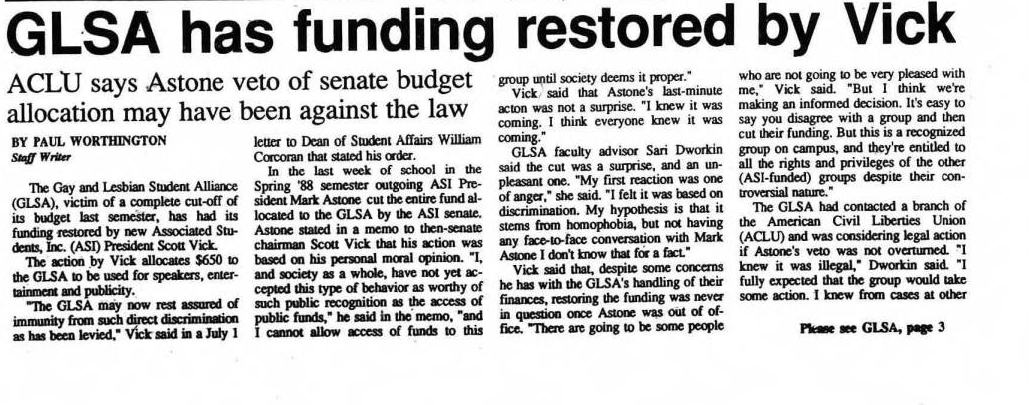
Robertson said that as a student he “knew of” Astone, but that Astone has “evolved” since his time on campus.
“He’s an ally with a capital A. I’m reluctant to dwell on him then in a negative way because I’ve seen him evolve to be a beautiful ally to the community in his own way,” Robertson said.
The GLSA was the victim of multiple instances of harassment in the years after the booth burning.
When the club held a silent vigil for AIDS victims in October 1988, it was criticized and led to the vandalism to their booth, with messages like “we spread AIDS” graffitied on the booth’s wall.

Things did not slow down in the next school year. Another incident occurred that left all of campus “taken aback,” according to Donnell Alexander, former editor-in-chief for The Collegian.
In February 1989, the Ku Klux Klan came to Fresno State’s campus in protest of the 8th annual conference of western states’ lesbian gay and bisexual students.
The LA Times reported that the conference attracted 130 students from 15 schools, and that 15 Klansmen showed up and circled the trucks with signs that said things like “Queers Go Home.”
“We ran a caption and it spoke for itself. People can become indifferent to The Collegian sometimes, but we have the Klan on the front page and protesting gay people,” Alexander said. “That was big news.”
Despite the backlash from the community, the club continued to rebuild and repaint its booth as necessary and “just survive,” according to Robertson.
“Every time we had an incident our club would get smaller. People [would say,] ‘This isn’t the right time. They’ve burned our booth. They’ve tagged our booth. The KKK’s here. We shouldn’t do this.’ But if not now, when? And if not us, who?” Robertson said.
The club, which now goes by the name United Student Pride, is celebrating its 35th anniversary this year, but much of its history is unknown by the campus community, according to Gill. The podcast co-creator said it was “a lot of new information” that isn’t being used in conversations about LGBTQ+ rights today.
Recent headlines have former GLSA members concerned that court decisions made in relation to same-sex marriage and other LGBTQ+ rights could be reversed, such as the Supreme Court’s recent overturn of Roe v. Wade.
Other legislation has caused similar concerns, such as a Florida Parental Rights in Education Lawlaw limiting LGBTQ+ discussions withing schools, referred to as the “Don’t Say Gay” bill. Florida Gov. Ron DeSantis signed the law on March 28, and it went into effect in June 2022.
A school district in Texas has also enacted a total ban on all classroom discussions of “gender fluidity,” according to The Washington Post.
“I’m married, and so it’s possible that within a year, I’ll lose my ability to stay married to a same-sex partner in America,” said former GLSA member Matt Cunningham. “Wow, does the pendulum swing back.”
Sari Dworkin, the founding advisor of the GLSA, said Roe v. Wade’s reversal illustrates how “we’re always in danger of losing our freedoms.”
“I think too often people today, young people today, don’t realize all the struggling — I think about the abortion issue here — all the struggles that we’ve gone through,” she said.
The students behind “Our Tower” are hopeful that they can continue to bring awareness of the club’s struggles to the community, and plan to create more podcast episodes in the future.
“It’s not necessarily part of the conversations that we’re now having around LGBTQ+ rights and inclusivity on campus, even though I feel like that provides a lot of important context and background to the struggle that these communities have gone through to make spaces for themselves,” Gill said.
Future podcast episodes will continue to focus on queer history in Fresno and feature stories from the community.
“We really want to hear more from the community. They have hundreds of stories to hear and we are ready to listen. Their stories are a part of Fresno’s LGBTQ+ community and it grew because of them,” Nichols said.
